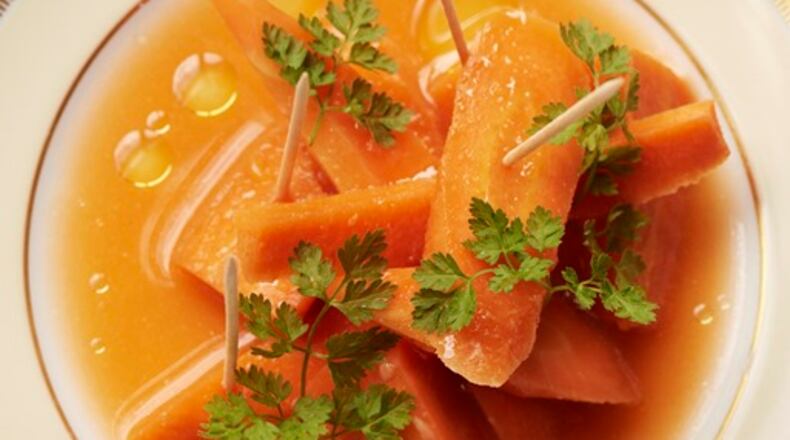Though chef Nuno Mendes was born in Lisbon and trained mostly in the United States, it’s his London restaurants — Chiltern Firehouse, for example — that have gained attention. His latest is Taberna do Mercado in East London’s Old Spitalfields Market. The informal, tightly packed 40-seat restaurant (with additional tables and a charcoal grill outside) looks like a sleek version of a Portuguese tavern: nothing fancy, but with plenty of attention to materials and details (including seating that is all too authentic: Some of the wooden chairs are really too small for grown-ups). The atmosphere is convivial; we had fun at the tiny concrete-topped bar, drinking and watching sausages being sliced.
At Taberna, the food is traditional Portuguese as seen through the eyes of an imaginative, skilled chef. But this sharp focus does not mean monotony. The menu is divided into snacks, cheese, cured meats, house-tinned fish, small plates, sandwiches and desserts. Wait — house-tinned fish? Yes, and it’s a perfect example of Mendes lending creativity to a barroom standby. The night we were there, soon after the restaurant opened in May, tiny scallops with their red roe had been sealed into oval cans with brown butter, chervil and walnuts, and precisely cooked: fresh-tasting seafood happily married with its seductive condiments.
Almost every table bore an order or two of prawn turnovers — creamy shrimp croquettes, pastry-clad, cleanly fried and redolent of crustacean — and at least one plate of cured meat served with bread crisped in a panino press. We ate thin-sliced cachaço, cured pork shoulder containing just the right amount of fat and served at ideal room temperature. Several dishes, including cod, cuttlefish and diced pork tartare, were surrounded by savory but light broths, which Mendes said were purely Portuguese. Still, I’d be surprised if a country inn could muster such elegant, balanced flavors. This is vivid, high-class cooking.
Just as most customers began with those turnovers, many seemed to finish with olive oil and runny egg sponge cake or with steamed egg-yolk flan made with rendered ham fat. We followed the crowd and ordered both, but they seemed one-dimensional compared with the depth of flavor in Taberna’s savory dishes.
About the Author
The Latest
Featured


